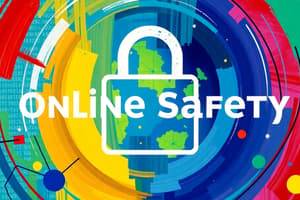Podcast
Questions and Answers
What is one of the key aspects of cybersecurity education mentioned in the text?
What is one of the key aspects of cybersecurity education mentioned in the text?
- Ensuring copyright compliance on the internet
- Creating engaging social media content
- Identifying scams and malware (correct)
- Optimizing search engine results
In the context of responsible content creation and sharing, what do individuals need to consider to avoid legal issues?
In the context of responsible content creation and sharing, what do individuals need to consider to avoid legal issues?
- Respecting intellectual property rights (correct)
- Promoting controversial opinions
- Using clickbait headlines
- Increasing social media followers
What is a fundamental aspect of digital citizenship highlighted in the text?
What is a fundamental aspect of digital citizenship highlighted in the text?
- Spreading misinformation intentionally
- Participating in online debates
- Respecting privacy settings (correct)
- Ignoring online community guidelines
How can individuals contribute positively to the digital community according to the text?
How can individuals contribute positively to the digital community according to the text?
Why are internet ethics and safeguards considered vital according to the text?
Why are internet ethics and safeguards considered vital according to the text?
Flashcards are hidden until you start studying
Study Notes
Internet Ethics and Safeguards
As our lives become increasingly intertwined with technology, particularly through the internet, it is essential to understand the importance of internet ethics and safeguarding ourselves from potential harm while using this powerful tool. This crucial aspect involves responsible behavior and protecting ourselves and others online. Let's delve into some key aspects of internet ethics and safeguards.
Online Safety Practices
Online safety practices encompass various measures that individuals can take to protect themselves from malicious activities such as cyberbullying, identity theft, and phishing. These practices include:
-
Strong Passwords: Using strong passwords that are unique for each account helps prevent unauthorized access to personal information.
-
Two-Factor Authentication: Enabling two-factor authentication adds an extra layer of security by requiring a code sent to your phone or another device before you log in to an account.
-
Privacy Settings: Regularly reviewing and adjusting privacy settings ensures that only intended parties have access to your data.
-
Safe Browsing Habits: Avoid clicking suspicious links in emails or messages and be cautious when downloading attachments.
-
Regular Security Checkups: Periodically checking your accounts for signs of unusual activity and updating software and apps regularly can help maintain security.
Cybersecurity Education
Cybersecurity education plays a critical role in helping people make informed decisions about their online activities. It teaches them how to identify scams, recognize malware, avoid falling victim to social engineering tactics, and safely dispose of sensitive documents and electronic equipment.
Responsible Content Creation and Sharing
The advent of social media has made content creation and sharing an integral part of everyday life. However, it also brings responsibilities. People need to ensure their content does not violate copyright laws or infringe upon someone else's rights. Additionally, they must consider the impact of their posts and comments on others, avoiding offensive or harmful speech.
Digital Citizenship
Digital citizenship refers to the norms of appropriate behavior and basic rights and responsibilities that apply to all internet users. Each individual has a responsibility to ensure they act ethically and respectfully online. This includes things like respecting intellectual property, understanding the consequences of one's actions, showing empathy towards others, and contributing positively to the digital community.
Conclusion
Internet ethics and safeguards are vital in ensuring that we make the most out of the opportunities presented by the internet without exposing ourselves to risks. By being aware of these concepts and following best practices, we can make the most out of our online experiences while minimizing any negative impacts.
Studying That Suits You
Use AI to generate personalized quizzes and flashcards to suit your learning preferences.




